Code
I ran my program 30 times, and n passed to run_and_join_threads() changed from 1 to 30 accordingly.
Note that jobs passed to run_and_join_threads() were populated by exactly the same way in each execution.
void do_job(JobQueue *jobs) {
Job job;
while (job = jobs->pop())
job();
// control flow goes here if jobs.pop() returns nullptr,
// which means all the jobs have been done
}
void run_and_join_threads(int n, JobQueue &jobs) {
vector<thread> threads;
threads.reserve(n);
for (int i = 0; i < n; ++i)
threads.push_back(thread(do_job, &jobs));
// synchronization
for (int i = 0; i < n; ++i)
threads[i].join();
}
JobQueue.h
#ifndef JOB_QUEUE_H
#define JOB_QUEUE_H
#include <functional>
#include <queue>
#include <mutex>
typedef std::function<void (void)> Job;
// Its methods are all atomic.
class JobQueue {
std::queue<Job> jobs;
std::mutex mtx;
public:
void push(Job job);
// pop removes the "oldest" job in the queue and returns it.
// pop returns nullptr if there's no more jobs left in the queue.
Job pop();
};
#endif
JobQueue.cc
#include "JobQueue.h"
using namespace std;
void JobQueue::push(Job job) {
mtx.lock();
jobs.push(job);
mtx.unlock();
}
Job JobQueue::pop() {
Job job = nullptr;
mtx.lock();
if (!jobs.empty()) {
job = jobs.front();
jobs.pop();
}
mtx.unlock();
return job;
}
Chart
I use perf stat -e instructions:u ./my_program to record number of instructions during my program execution.
I then found that there is a negative correlation between number of threads and number of user instructions.

My Thoughts
Since the "real task" remains the same, more threads should lead to more thread construction and destruction, which results in more instructions, but that's not the case from the chart. I tried to google with the keywords in the title, but no luck.
compilation options: -std=c++14 -pthread -Wextra -Werror -MMD
gcc version: 8.2.1 20180831
Output of --per-thread when n = 10
hw4-9525 8,524.37 msec task-clock:u # 0.153 CPUs utilized
hw4-9524 8,082.77 msec task-clock:u # 0.145 CPUs utilized
hw4-9522 7,824.93 msec task-clock:u # 0.140 CPUs utilized
hw4-9519 7,782.65 msec task-clock:u # 0.139 CPUs utilized
hw4-9518 7,734.42 msec task-clock:u # 0.138 CPUs utilized
hw4-9517 7,722.12 msec task-clock:u # 0.138 CPUs utilized
hw4-9520 7,636.99 msec task-clock:u # 0.137 CPUs utilized
hw4-9425 11,899.78 msec task-clock:u # 0.213 CPUs utilized
hw4-9521 7,585.14 msec task-clock:u # 0.136 CPUs utilized
hw4-9526 7,580.60 msec task-clock:u # 0.136 CPUs utilized
hw4-9523 7,306.57 msec task-clock:u # 0.131 CPUs utilized
hw4-9425 0 context-switches:u # 0.000 K/sec
hw4-9517 0 context-switches:u # 0.000 K/sec
hw4-9518 0 context-switches:u # 0.000 K/sec
hw4-9519 0 context-switches:u # 0.000 K/sec
hw4-9520 0 context-switches:u # 0.000 K/sec
hw4-9521 0 context-switches:u # 0.000 K/sec
hw4-9522 0 context-switches:u # 0.000 K/sec
hw4-9523 0 context-switches:u # 0.000 K/sec
hw4-9524 0 context-switches:u # 0.000 K/sec
hw4-9525 0 context-switches:u # 0.000 K/sec
hw4-9526 0 context-switches:u # 0.000 K/sec
hw4-9425 0 cpu-migrations:u # 0.000 K/sec
hw4-9517 0 cpu-migrations:u # 0.000 K/sec
hw4-9518 0 cpu-migrations:u # 0.000 K/sec
hw4-9519 0 cpu-migrations:u # 0.000 K/sec
hw4-9520 0 cpu-migrations:u # 0.000 K/sec
hw4-9521 0 cpu-migrations:u # 0.000 K/sec
hw4-9522 0 cpu-migrations:u # 0.000 K/sec
hw4-9523 0 cpu-migrations:u # 0.000 K/sec
hw4-9524 0 cpu-migrations:u # 0.000 K/sec
hw4-9525 0 cpu-migrations:u # 0.000 K/sec
hw4-9526 0 cpu-migrations:u # 0.000 K/sec
hw4-9425 9,332 page-faults:u # 1144.724 M/sec
hw4-9520 7,487 page-faults:u # 918.404 M/sec
hw4-9526 7,408 page-faults:u # 908.714 M/sec
hw4-9522 7,401 page-faults:u # 907.855 M/sec
hw4-9518 7,386 page-faults:u # 906.015 M/sec
hw4-9524 7,362 page-faults:u # 903.071 M/sec
hw4-9521 7,348 page-faults:u # 901.354 M/sec
hw4-9525 7,258 page-faults:u # 890.314 M/sec
hw4-9517 7,253 page-faults:u # 889.700 M/sec
hw4-9519 7,153 page-faults:u # 877.434 M/sec
hw4-9523 6,194 page-faults:u # 759.797 M/sec
hw4-9425 24,365,706,871 cycles:u # 2988857.145 GHz
hw4-9524 19,199,338,912 cycles:u # 2355116.623 GHz
hw4-9518 18,658,195,691 cycles:u # 2288736.452 GHz
hw4-9522 18,565,304,421 cycles:u # 2277341.801 GHz
hw4-9520 18,524,344,417 cycles:u # 2272317.378 GHz
hw4-9519 18,452,590,959 cycles:u # 2263515.629 GHz
hw4-9521 18,384,181,678 cycles:u # 2255124.099 GHz
hw4-9517 18,169,025,051 cycles:u # 2228731.578 GHz
hw4-9526 17,957,925,085 cycles:u # 2202836.674 GHz
hw4-9523 17,689,877,988 cycles:u # 2169956.262 GHz
hw4-9525 20,380,269,586 cycles:u # 2499977.312 GHz
hw4-9524 35,930,781,858 instructions:u # 1.88 insn per cycle
hw4-9425 31,238,610,254 instructions:u # 1.63 insn per cycle
hw4-9522 34,856,962,399 instructions:u # 1.82 insn per cycle
hw4-9518 34,794,129,974 instructions:u # 1.82 insn per cycle
hw4-9520 34,565,759,122 instructions:u # 1.81 insn per cycle
hw4-9519 34,521,122,564 instructions:u # 1.81 insn per cycle
hw4-9521 34,389,796,009 instructions:u # 1.80 insn per cycle
hw4-9517 33,823,905,990 instructions:u # 1.77 insn per cycle
hw4-9525 38,084,271,354 instructions:u # 1.99 insn per cycle
hw4-9526 33,682,632,175 instructions:u # 1.76 insn per cycle
hw4-9523 33,147,549,812 instructions:u # 1.73 insn per cycle
hw4-9525 6,113,561,884 branches:u # 749929530.566 M/sec
hw4-9425 5,978,592,665 branches:u # 733373322.423 M/sec
hw4-9524 5,765,141,950 branches:u # 707190060.107 M/sec
hw4-9522 5,593,987,998 branches:u # 686195195.687 M/sec
hw4-9518 5,583,032,551 branches:u # 684851328.824 M/sec
hw4-9520 5,546,955,396 branches:u # 680425868.769 M/sec
hw4-9519 5,541,456,246 branches:u # 679751307.023 M/sec
hw4-9521 5,518,407,713 branches:u # 676924023.050 M/sec
hw4-9517 5,427,113,316 branches:u # 665725254.544 M/sec
hw4-9526 5,407,241,325 branches:u # 663287626.012 M/sec
hw4-9523 5,318,730,317 branches:u # 652430286.226 M/sec
hw4-9525 66,142,537 branch-misses:u # 1.18% of all branches
hw4-9524 61,835,669 branch-misses:u # 1.10% of all branches
hw4-9518 61,243,167 branch-misses:u # 1.09% of all branches
hw4-9520 60,266,206 branch-misses:u # 1.07% of all branches
hw4-9521 59,396,966 branch-misses:u # 1.06% of all branches
hw4-9522 59,227,658 branch-misses:u # 1.05% of all branches
hw4-9519 59,210,503 branch-misses:u # 1.05% of all branches
hw4-9526 57,983,090 branch-misses:u # 1.03% of all branches
hw4-9517 57,910,215 branch-misses:u # 1.03% of all branches
hw4-9523 56,251,632 branch-misses:u # 1.00% of all branches
hw4-9425 32,626,137 branch-misses:u # 0.58% of all branches